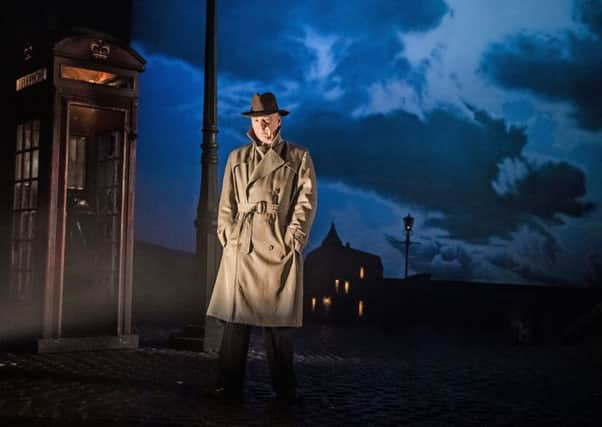Liam Brennan on An Inspector Calls: “I love the technical challenge of it”


His breakthrough to nationwide fame, though, came with his legendary Postscript series of Sunday-night radio talks, delivered during 1940 and 1941, which – in the darkest days of the war – helped provide people in Britain with a compelling vision of the more just and equal postwar world for which they should be fighting. His talks were hugely influential in laying the ground for the landslide Labour victory of 1945; and Priestley’s socialist convictions also burn brightly in An Inspector Calls, as he tells the story, set in the complacent years just before the First World War, of the wealthy Birling family, leading citizens of a northern industrial town, and of the mysterious police inspector who arrives one night to expose the many ways in which they have all been complicit in the death of a young working-class woman.
An Inspector Calls is a very traditional three-act play in style; it works like a thriller, and draws on the fascination with 20th century theories of time that helped shape many of Priestley’s plays, hinting that Inspector Goole, as he is called, may be visiting the Birlings from another dimension entirely. Yet its mastery of conventional theatre techniques only increases its political force; and although Priestley’s work went out of fashion for a generation after 1960, it’s perhaps not surprising that Stephen Daldry’s great National Theatre revival of 1992, produced after 13 years of Thatcherite government in Britain – including Mrs Thatcher’s famous pronouncement that “there is no such thing as society” – should have become one of the NT’s most successful shows ever, still on tour after 27 years. The play has become a staple of school curriculums; and this week, Daldry’s production, with its famous dream-like set by Ian MacNeil, returns to Edinburgh, this time with the Scottish actor Liam Brennan in the role of Inspector Goole, following in the mighty footsteps of – among others – Ralph Richardson, Alistair Sim and Kenneth Cranham.
Advertisement
Hide Ad“I first became involved in this production in 2015,” says Brennan, speaking from the New Theatre in Hull. “This show tours the UK every four years, playing to a new generation of school students every time. So I played Goole in the UK tour of 2015-16, then in a short West End run, and then on Broadway. And now we’re off round the UK again, from September until next May. There tend to be cast changes between tours, of course, which helps to keep the show really fresh. But really, my approach to playing in the same production over a long period is very much shaped by what I learned from Mark Rylance, when I was working at Shakespeare’s Globe; it’s about always striving to be absolutely in the moment, and to retain that feeling that you really don’t know what the other actor is going to say next.”
Born in Kilmarnock in 1964, Brennan was 20 by the time he arrived at the Royal Scottish Academy of Music and Drama; the teenage Liam even spent a year at a seminary, considering becoming a priest, before he finally found his true vocation.
After he graduated, he became a key player in the Scottish theatre scene of the 1990s and 2000s, appearing mainly at the Traverse and the Lyceum, in shows ranging from David Greig’s The Speculator to Jo Clifford’s Anna Karenina. Despite some screen work, including recent appearances in Shetland, theatre has remained his first love; his home base is firmly in Scotland, and his only concern about his recent success in London, at the Globe and with An Inspector Calls, is that it has kept him away from the Scottish stage scene he loves.
“I do love this play, though,” he says. “I love that it works so well as a thriller, and I love the technical challenge of it. Before I played Goole, I never realised just how completely on top of the script you have to be when you’re playing a detective, because you’re always asking questions and changing the subject, rarely just responding to a question from another character.
“As for Priestley himself – well, I do still find him a hard man to read. He was a lifelong socialist, yet he never joined a party, and you sense that he didn’t like to be pinned down. Yet there is a lot of anger there; and I love the way this production responds to that by showing the inspector as a kind of visitor from the year 1945, when the play was written, to the Birlings, who are back in 1912, and know nothing of the two devastating world wars that are to come.
“I also love the fact that in this production, the inspector is not portrayed as some kind of all-powerful figure, always in control. Here, he is more of a man in a hurry, anxious and angry that the Birlings may not get the message in time. There are some obvious present-day parallels there, particularly in the way the two younger members of the family begin to get the point long before their parents do. And it’s because they don’t get it, before Goole leaves, that the phone has to ring again, at the very end of the play. They haven’t learned; and now, says Priestley, they have to relive it all, once again.” Joyce McMillan
An Inspector Calls is at the King’s Theatre, Edinburgh, from 8-12 October, and the Theatre Royal, Glasgow, from 24-28 March 2020